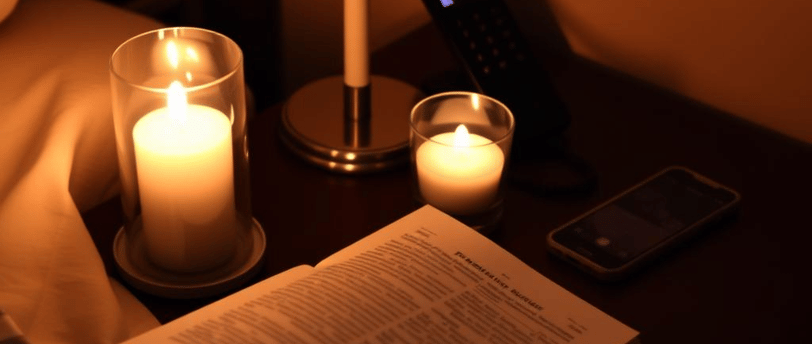Turn Off Screens an Hour Before Bed: The Impact of Blue Light on Melatonin Production
🧘WELLNESS TIPS✨SELF-CARE & LIFESTYLE HABITS


In today’s fast-paced digital world, screens have become an integral part of our lives. Whether we’re scrolling through social media, binge-watching our favorite shows, or attending virtual meetings, the blue light emitted from our devices is omnipresent. However, as we enjoy these conveniences, many are unaware of how this exposure, particularly before bedtime, can disrupt our sleep patterns and overall health. One of the most critical ways that blue light impacts our body is through its suppression of melatonin production, the hormone responsible for regulating sleep.
Understanding Melatonin: The Sleep Hormone
Melatonin is a hormone naturally produced by the pineal gland in our brains during darkness. It signals to our body that it is time to wind down and prepare for sleep. Melatonin production is closely tied to the cycle of light and darkness; it typically begins to rise in the evening as the sun sets, peaks during the night, and decreases with the first light of dawn. This natural rhythm, known as the circadian rhythm, is crucial for maintaining healthy sleep patterns.
Scientific studies have shown that melatonin has several vital functions in our body. Beyond regulating sleep, melatonin is also known for its antioxidant properties and roles in immune function and reproductive health. Disruption of melatonin production can lead to various issues including insomnia, mood disturbances, metabolic problems, and decreased overall well-being.
The Role of Blue Light
Blue light, which has a short wavelength, is emitted by screens of smartphones, tablets, TVs, and computers, as well as artificial lighting. While exposure to blue light during the day can improve alertness, cognitive function, and mood, exposure during the evening hours can have adverse effects. Research indicates that blue light can inhibit melatonin production more substantially than any other kind of light.
A groundbreaking study published in the Journal of Clinical Endocrinology & Metabolism demonstrated that participants exposed to blue light at night had significantly lower melatonin levels than those exposed to dim red light. This finding raises alarms about our nighttime routines; many people are unwittingly sabotaging their sleep by engaging with screens just before bedtime.
The Consequences of Poor Sleep Hygiene
The importance of quality sleep cannot be overstated. Sleep is crucial not just for physical restoration, but for mental health, mood regulation, and cognitive function. Chronic sleep deprivation has been linked to a myriad of health problems, including obesity, diabetes, cardiovascular diseases, and psychological disorders.
Moreover, poor sleep resulting from blue light exposure can create a vicious cycle. Sleep deprivation can lead to increased stress levels, making it more difficult to unwind after a long day and potentially leading to more screen time in the evening as a way to cope. The irony is that, while screens may provide momentary relief or distraction, they significantly contribute to poor sleep quality, exacerbating stress and anxiety.
Tips for Reducing Blue Light Exposure Before Bed
If you’re struggling with sleep or simply want to optimize your rest, here are some practical strategies to minimize blue light exposure in the hour leading up to bedtime:
1. Set a Screen Curfew
One of the most effective methods to reduce blue light exposure is to set a curfew for screen time. Aim to turn off all screens at least one hour before bed. Use this time to unwind with activities that don’t involve electronics, such as reading a book, practicing mindfulness, or taking a warm bath.
2. Use Blue Light Filters
If you must use devices in the evening, consider using blue light filter apps or glasses. Many smartphones and computers now come with “night mode” settings that adjust the display to emit warmer colors less harshly on the eyes. Although not a perfect solution, these tools can mitigate some of the blue light’s impact.
3. Create a Relaxing Bedtime Routine
Establishing a calming pre-sleep routine can signal to your body that it’s time to wind down. This might include dimming the lights in your home, listening to soothing music, or engaging in relaxation techniques such as meditation or gentle yoga.
4. Prioritize Natural Light During the Day
Exposing yourself to natural light during daylight hours can help regulate your circadian rhythms. Try to spend some time outside each day, particularly in the morning. This can enhance alertness during the day and help signal to your body when it’s time to produce melatonin in the evening.
5. Create a Sleep-Friendly Environment
Ensure your sleeping space is conducive to rest. This may involve using blackout curtains, maintaining a cool room temperature, and minimizing noise disturbances. An optimal sleep environment supports your natural melatonin production.
Conclusion
In a world that is increasingly digital, being mindful of our screen time, especially in the hour leading up to bedtime, has never been more vital. With growing evidence of how blue light disrupts melatonin production, instilling healthy sleep habits is essential for both mental and physical wellness. By prioritizing sleep hygiene and making conscious choices about our evening routines, we can enhance our overall quality of life, reduce illness risks, and foster a healthier relationship with technology. So tonight, take the step to turn off your screens an hour before bed—your body will thank you.
